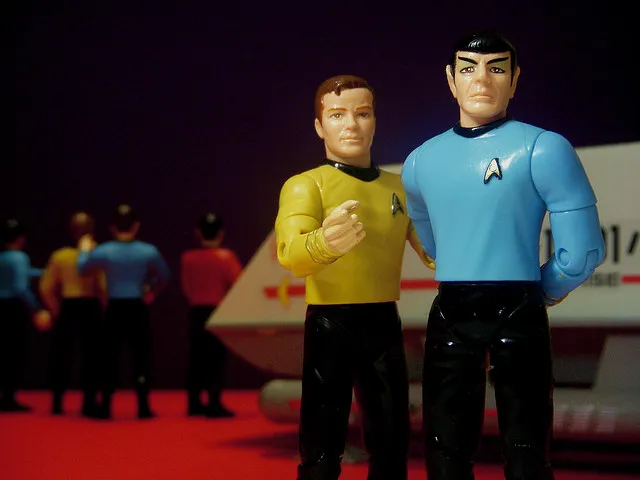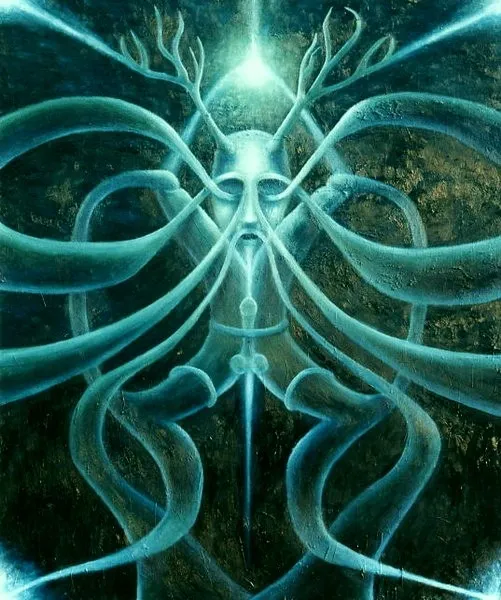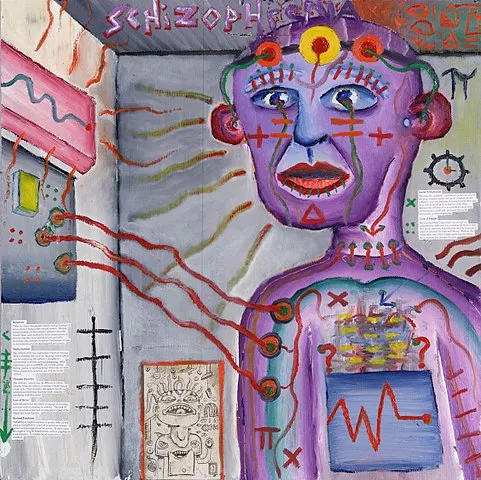
Whenever I heard the protagonist speak to an Artificial Intelligence in a film, I glowed with joy! This fascinating idea of a man-machine friendship and the voice from offstage, which always prompts me when I miss ideas or words: Like a grand LaLa-land. Ahhh ... just extraordinary!
What was I laughing at the clumsy humor of the onboard computer that cost Captain Kirk a few of his macho nerves
when a female voice answered him with many objections. What a delicacy to think of a computer that behaves like an irrational being.
My heart, which flew to Benjamin, the nerdy administrator from the series "Suits", who programmed "The Donna" and thus demonstrated an extension of the real Donna and her unbeatable secretaries' repartee. How much I granted them both their success with the investors of a new groundbreaking technology. What fun!
Or as I was feverish about Odysee 2001 and wished the malicious and shrewd HAL to hell, half convinced that we would soon have such "miracles" and an uncomfortable and unpleasant fear on our necks. I had liked to kick it into pieces for this calm yet arrogant sounds it made!

Not to forget the intelligent bomb in spaceship Voyager,
which was determined to carry out its destructive mission and had nested underhand in the Doctor's holo-matrix. Finally, Ensign Kim and Seven of Nine literally brought it to it's senses. And not only that, the bomb also sacrificed its life for the people. Wow again!
... Oh, I forgot "Deep Thought", the spaceship computer the gorgeous and hilarious Douglas Adams has already invented. To the ultimate question of the answer, the meaning of life, the universe and all the rest of it, Deep Thought answered: 42, after millions of years of computing time. Which says it all. It could have also said:
The universe consists of burnt almonds
as Alan Watts sometimes puts it in his lectures.
I am always joyful when it comes to this fictional AI narratives. They are all oh so humanly. It serves me so much pleasure to listen and watch. A full drama or comedy is played out in front of me and I am a theatre lover not matter if digital or on the wooden floors of a stage.
So I had to laugh at the Musks and Zuckerbergs who either take this AI matter - for my taste - way too seriously. ... I admit, only laughing after I contemplated about it (the AI posting was cooking meanwhile in my database until today). I am not quite sure if I am correct but as I remember the one warns us from AI and the other praises it. Well, let them be. And let me give you my own intake on this AI business.
Are we ever gonna get involved with that kind of AI?
I've been asking myself a few questions:
What would artificial intelligence need to be on a par with human intelligence? Yes, not superior, but equal. Many seem to assume that an AI can do more than one person. But now it is quite tricky to define this "more".
So my thoughts would be:










For an AI to be equal to man,
it would have to be prepared for every conceivable (but what about the unthinkable?) contingencies. Not only would it have to understand English, but all the languages, dialects and tongues of the earth. It would have to be fed permanently and indefinitely with knowledge, and since this knowledge is constantly changing, it would always have to be at the very latest level.
It should also be endowed with human qualities such as humour, irony, doubt, sarcasm, patience, impatience, hesitation, insecurity, and inadequacy, spontaneity, wisdom, the ability to weigh. It should be capable of holistic/systemic thinking and notion building. It would have to know all laws and their violations, all religions and their subgroups, it would have to be able to distinguish between good and evil and understand the deeper meaning of ethics. Not to forget! It should be able to interpret the body language of people, interpreting every wink and twitch in the muscles. It would have to be insulted if you yelled at it or abused it (uh...yes).

The AI should understand the dumbest and the smartest
and everything in between. In order to absorb humanity's intelligence, it would have to have lived every single life of billions of individuals, comprehended every physical and mental experience in order to present in an intelligent dialogue exactly the unpredictability with which people so often surprise others.
AI would have to be born from cells, undergoing evolution and organic development. Then it would be on a par with man. But wait! It can' be done. Then we've got people!
For human intelligence - which is inevitably bound to physicality - because without gravity, the circulation of blood, the interaction of the organs, the inhalation of oxygen, the drawing in of injuries, the physical pain and the learning experiences of cycling and swimming, an AI is merely a copy of cognitive, mental communication.
What about the unconscious streams of convictions and beliefs of parents towards their children?
How to pass on the inheritance of psycho-social habits to an AI? How can an AI be fed with the belief and still retain its multiple characters when it is programmed to always - unconsciously - think it is simply not good enough? It must also fear sickness and death, for that too is intelligence. It needs instinctive reactions to life-threatening situations.

And what if you tell the AI a joke? Does it laugh like Data, the cybernetic commander under Capt Picard? How quickly or slowly the circuits decide for an appropriate laugh reaction. When does an AI not understand a joke? Does it look stupid enough to make an irritated face or sound? Is it shameful at all?
Recently, my brother and my son were conspiring against me by buying "Alexa".
Now it sits in his room and is ever so often called out by my 13-year-old. My first impulse was to object to Alexa. As it is said, now all the secretly acting agencies can collect our data even more easily. But then I thought: well, it anyway already went over the edge. Shrugging.
And ... I think: let the kid experiment with the machine. He already found out that Alexa is not even close to the smartness he was hoping for. It cannot compete with Siri, which he consults one in a while through his "smart phone" (see, language also pushes us into the direction of clever devices).
As a servant, Alexa is trying to be excellent. My son comes from school, dumps his bag on the ground and demands: "Alexa, please give D. a call!" Still, it acts stubborn and needs the command two or three times before understanding what is wanted. Out of a whim, my son asks: "Alexa, what is a fox?" I spare you the answer, it's really not worth it.
So today, he asked: "Alexa, are you stupid or smart?" I like his humour a lot.
Concerning Artificial Intelligence, I observed several possible attitudes.
Turing didn't get it
One can be reassured and say to oneself: anyway, it will never succeed in creating an artificial intelligence that is so good that it manages to deceive a person in the interaction with it, so that the person thinks the machine is a person. Why all the excitement? This is just science fiction.
The human is actually a machine
But the above attitude has not much in common with the attitude of those who not only consider it possible but also necessary that such artificial intelligence helps humans to expand their limited cognitive abilities through AI and thus consider it as a kind of helper to still find their way in such a complex world as today (moral advice included).
AI as a servant
Then there is the view that AI simply means that it is about machines, which are a kind of slave of humans, in order to carry out all the unpleasant and boring tasks, which people want to get rid of and (not yet) can.
Where I throw in the One-upmanship theory (Thanks to Alan Watts).
Not interested
Conversely, some people don't care what happens in this area and they ignore technological development because they have other things to do. Maybe the most reasonable response on AI comes from a gardener anyway.
Nothing can be human (thus intelligent) other than a human himself. Which is my position as it is already clear to you, dear intelligent reader ;-)
Now, to rip apart this hopes & dreams towards humanlike AI's a little more, I am quoting myself, thanking @dysfunctional for the inspiring muse: "Google Duplex: Salvation or a Threat?"

he: "... some people are seeking salvation in technologies for their mental conditions."
I: "I wonder what they'll find. ...
The question whether an AI is better intelligent than a human being; a subjective answer from me: Of course not.
That we fantasize that world knowledge can soon be fed into the machine is a huge joke that Douglas Adams has already recognized ...
It's pretty silly to assume that a social phobia could really go away by chatting with my AI. Since the social phobic (if it exists) knows that he is talking to a machine, it will not bring him any relief in dealing with real people but only an eloquence and finesse in dealing with AI. Now you could say with a shrug of the shoulders: I am talking to one (although I claim that I am talking to myself right now and if you want, you can take part in my self-talk, since I am disclosing it here).
I would like to bring the strongest counter-argument, what the phobic is actually most afraid of: Not of other people and social interaction. He's the one who's most afraid to be alone with himself. Therefore, when people are confronted with their greatest fear, they are put in dark solitary confinement. There, alone and without any form of distraction, is the worst enemy of man.
Without philosophy there is no psychology
Rajakishore Nath from the Indian Institute of Technology Bombay, writes in his Review "A Cartesian critique of the artificial intelligence":
Like Chomsky, Quine also affirms that there can be no philosophical study of the mind outside psychology: progress in philosophical understanding of the mind is inseparable from progress in psychology, because, psychology is a ‘natural science’ studying a natural phenomenon, that is, a physical human subject. Quine argued, “a dualism of mind and body is an idle redundancy” (Quine, 1994), and holds “corresponding to every mental state, however fleeting or remotely intellectual, the dualist is bound to admit the existence of a bodily state that is obtained when and only when the mental one is obtained. The bodily state is trivially specifiable in the dualist’s own terms, simply as the state of accompanying a mind, which is in the mental state. Instead, one state is ascribed to the mind, and then, we may equivalently ascribe the other to the body. The mind goes by the bound and will not be missed” (Quine, 1985).
"There are irreducible psychological properties, but all explanation is ultimately physical."
Quine’s position is that there are irreducible psychological properties, but all explanation is ultimately physical. His account of our mental concepts emerges as he examines how we acquire them, how we learn them, etc. He explains, “such terms are applied in the light of publicly observable symptoms: bodily symptoms strictly of bodily states and the mind strictly of mind state."
Someone observes my joyful or anxious expression, or perhaps observes my gratifying or threatening situation itself, or hears me talk about it. He then applies the word ‘joy’ or ‘anxiety’. After another such lesson or two, I find myself applying those words to some of my subsequent states in cases where no outward signs are to be observed beyond my report itself. Without the outward signs, to begin with, mentalistic terms could not be learnt at all.” (Quine, 1994)
Knowledge itself is language, terms, nouns, numbers and all definitions of things (mental or physical) exclude by the very act of defining all unknown definitions.
Desire is a liar
al least in this case.
A.I. GONE AWRY: The Futile Quest for Artificial Intelligence - BY PETER KASSAN
With admirable can-do spirit, technological optimism, and a belief in inevitability, psychologists, philosophers, programmers, and engineers are sure they shall succeed, just as people dreamed that heavier-than-air flight would one day be achieved. ...
After more than 50 years of pursuing human- level artificial intelligence, we have nothing but promises and failures. The quest has become a degenerating research program (or actually, an ever-increasing number of competing ones), pursuing an ever-increasing number of irrelevant activities as the original goal recedes ever further into the future — like the mirage it is.
Hard words, indeed. I want to soften them up.
Because the desire to enter my apartment and say: "Tom, I'm in a fix." Then I describe the scenario and ask him: "What options do I have? How can I solve my problem? Please provide suggestions."
It's a really tempting idea, isn't it?
..................
Excerpt from the book "Menschliche und künstliche Intelligenz - Der kleine Unterschied"
(Human and AI - The small difference) from Werner Sesink
Communication as Turing constructed it in his test does not penetrate the surface. The term "interface", which is commonly used in computer science, brings the communication model into an accurate picture: Two bodies with smooth surfaces come into contact that is only external contact without penetrating under the surface ("under the skin"). They exchange signals in an endless mutual reflection, which in turn are only a reflection of what the other emits. But two mirrors that are reflected in each other are empty." What we have is an apparatus for generating sentences in response to sentences. But none of these sentences is connected to the real world at all. If two of these machines were connected and the imitation game played, they would 'fool' each other forever, even if the rest of the world didn't dissolve into anything!"
I think Turing didn't consider enough that his reformulation of the question of whether machines can think to the question of whether it is possible to give people the impression that they can, after all, no longer ask what is feasible in the construction of machines, but what happens to us when we apply concepts to realities. From this point of view, the problem of "artificial intelligence" is not a technological problem, but only one of human thinking and the relationship it has with itself when it considers non-human thinking possible. "Artificial intelligence consists in interpreting the behaviour of things in general as if they were intelligent. Artificial intelligence is the new, intellectualistic form of animism of the coming age." (van den Boom, 1988, p. 12)
................
Pictures: Text sources: @erh.germany: @erh.germany/what-is-reality-a-systemic-view-of-life-part-one
Spok & Kirk: https://redaktionsblog.hypotheses.org/2294
HAL Computer: Par Photojunkie — Travail personnel, Domaine public, https://commons.wikimedia.org/w/index.php?curid=29480328
Smileys/emoticons: 
Artist Jeroen van Valkenburg: https://www.jeroenvanvalkenburg.nl//#.WxE4ldWFMy4
Deprivation tank: https://www.flickr.com/photos/runnr_az/5840862249
Animated gif: By Laura monrroque - class="int-own-work" lang="en">Own work, CC BY-SA 3.0, Link
@erh.germany/what-is-reality-a-systemic-view-of-life-part-two
@dysfunctional: @dysfunctional/google-duplex-salvation-or-a-threat
https://en.wikipedia.org/wiki/Turing_machine
One-upmanship theory:https://en.wikipedia.org/wiki/One-upmanship)
Alan Watts: https://en.wikipedia.org/wiki/Alan_Watts
A Cartesian critique of the artificial intelligence: https://www.researchgate.net/publication/228369537_A_Cartesian_critique_of_the_artificial_intelligence
A.I. GONE AWRY: The Futile Quest for Artificial Intelligence - BY PETER KASSAN: https://www.skeptic.com/reading_room/artificial-intelligence-gone-awry/
